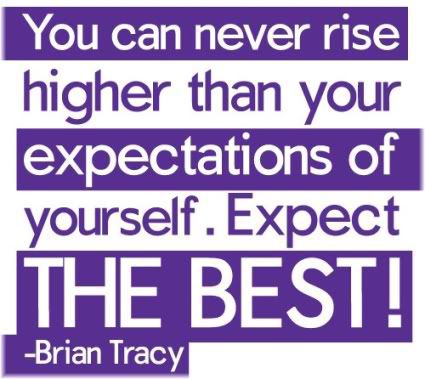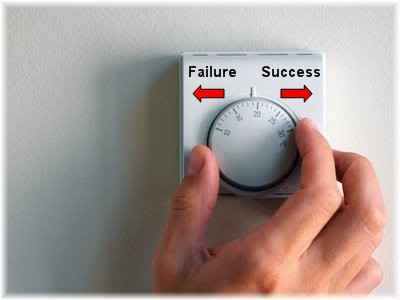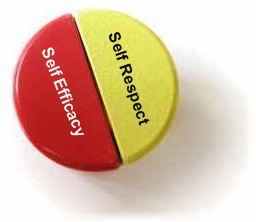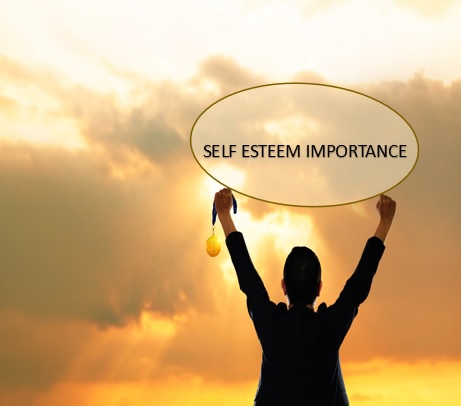People living in today’s society live in a fast paced and ever-changing world. These changes are largely a result of our various technological and informational breakthroughs.
However, whilst these things certainly do make life easier and more convenient, they have ultimately lead to a reduction in the personal stability that people once enjoyed.
No longer is it common to have one single job for life. No longer is it common to stay in one relationship for life. And no longer is it common to live, work and die in the place where you were born.
All of these changes, no matter how large or small they may be, affect people’s lives in different ways. Some of these changes may bring you joy and happiness, whilst others may bring you pain and sorrow.

It is therefore absolutely essential than in order for you to successfully survive through these changes, that you create a sense of stability within yourself.
This stability comes from having a clear sense of identity, confidence and self-worth. Or in other words, self-esteem.
What Influences Self Esteem?
Self esteem means much more than an innate sense of self-worth. Self esteem means having confidence in your ability to think, to cope with the challenges of life and a recognition that you are worthy of happiness and success. Trusting your mind and knowing that you are worthy of greatness is therefore the very essence of self-esteem.
Self esteem can be shaped by both internal and external factors. This means that both the things within you, and the things outside of you, can affect how you think and feel about yourself. In order to successfully build and maintain your self-esteem, both factors must be addressed.
1) Internal Influences

Internal factors are those that come from within you, and relate to how you treat yourself.
This could include things such as the way you talk to yourself (self talk), the way you think or the things you believe in. True self-esteem can only be obtained via these internal factors.
2) External Influences

External factors come from outside of you, such as from the environment in which you live and work. They can be transmitted either verbally or non verbally, and are usually sent from the people whom you see and interact with on a daily basis.
External factors play a big role in how you think and feel about yourself. However, do not make the mistake of relying solely upon them for the development of your self-esteem.
For if you do so, and circumstances in your life suddenly change, you will quickly find that your level of self-esteem suffers and so do you.
What is the cause of low self esteem?
Anything that makes you feel valuable, special, worthwhile, needed, important or anything else that makes you feel good, will raise your level of self-esteem. But the opposite is also true.
Anything that makes you feel bad such as a fear of failure, poverty, self-doubt, rejection or criticism will lower your feeling of self-worth and create low self-esteem.
So when you break things down to this level, it really is quite simple to understand. Things that make you feel good will raise your self-esteem. Things that make you feel bad will lower your self-esteem.

Of course, self-esteem is a bit more complicated than this, and there are many other factors which can play a role in shaping how you feel.
But if you can apply this basic principle of maximizing the good things in your life, and eliminating or reducing the bad, you will notice that your self-esteem will rapidly start to improve.
How self esteem influences your behavior
Self esteem is a motivator that inspires behavior, but behavior also inspires self-esteem. Therefore, there is a continuous feedback loop between the way you act and the level of your self-esteem. One cannot exist without the other.
For example, with high self-esteem you are more likely to persist in the face of difficulties. But with low self-esteem, you are more likely to give up or go through the motions without really trying or giving your best.
If you are persistent, then in all likelihood you will succeed more times than you fail. The net result of which will increase your level of confidence and self-worth.
But if you give up easily, or don’t try your best, then you will likely fail more often than you succeed which will then reduce your level of confidence and self-worth. Either way, your view of yourself will be reinforced.

Put simply, this means that you can improve the way you think and feel about yourself by improving the way you act. If you always try your best, never give up and act with integrity, then sooner or later success will come your way.
With that success will come higher levels of self-esteem, which will then bring further successes that generate even higher levels of self-esteem. Once you get it started, this self reinforcing feedback loop will build your self-esteem automatically over time which is why it is often said that success breeds success.
And this is the real value of having high self-esteem, as once developed, it will allow you to respond to new opportunities and challenges more appropriately and effectively than you once did. As a result, not only will you begin to feel better about yourself, but you will also find that you begin to live better too.
Your changing self esteem
The level of your self-esteem is not set once and for all in childhood. It can grow as you mature, or it can deteriorate. There are people whose self-esteem was higher at the age of 10 than 20, and the reverse is also true.
So remember, that self-esteem can fluctuate throughout your lifetime. It can rise and it can fall. I know mine certainly has.

I can think back to times in my life when my self-esteem reflected the choices I made in the face of various challenges. I can think of instances when I made choices that I am proud of, and with those choices, my self-esteem rose. But at the same time, I can also recall making choices that I regret, and which ultimately, lowered my self-esteem.
With regard to the choices that lowered my self-esteem, I think of times when I was unwilling to see what I saw and know what I knew. I found it easier to bury my head in the sand and ignore the obvious reality around me. I think of times when I needed to examine my feelings, but instead, I ignored them and pretended that everything was OK.
I think of times when I needed to walk away from a relationship, but instead, I struggled to keep it going. Times when I needed to stand up for my deepest feelings and assert my deepest needs, but instead, I remained quiet and hid what was within me, never expressing my true self.
Challenges and choices are a part of life
We all face challenges in life, and sometimes, we make choices that we are proud of, and other times, we make choices that we regret. In my opinion, the thing that really counts is not whether the choices you make are good or bad, but rather, what you learn from them.
Sometimes, the things that seem really bad turn out to be a blessing in disguise and end up improving your life in ways that you could have never imagined. This has happened to me on many occasions.

I remember when I broke up with my first proper girlfriend (when I say broke up, I mean she left me), I was really upset and felt like it was the worst possible thing that ever happened to me. It hurt me for a long time, but I got over her.
Now, I look back and am thankful for that experience, because I learned a lot from it and can see that it made me a stronger person. So now my attitude is that I no longer fear making mistakes or bad choices, because I know that each choice I make, whether good or bad, will still benefit me in the end.
This does not mean that I will experience no joy or pain from my choices, but rather, that I am willing to accept whatever lesson I have to learn whether I like it or not. If you can adopt this attitude, you too will finding developing your self-esteem to a higher level much easier to do.
Self Esteem & Success
Having low self-esteem does not necessarily mean that you will be incapable of achieving success, as many people still have the drive, energy and talent to achieve great things despite feelings of inadequacy or unworthiness.
An example of this could include a highly productive workaholic who is driven to prove their worth to a significant person in their life, such as a mother or father, who told them that they would never achieve much in life.
However, whilst having strongly desired goals and a sense of purpose certainly can serve as a powerful motivator, having low self-esteem will still mean that this individual will perform far less effectively and creatively than they would have if they had a high level of self-esteem.

Another major consequence of being driven by a desire to please others, is that once your objective has been achieved you are unlikely to experience any true joy from your accomplishment. Consider this last point carefully, especially if you are at school or are about to leave school.
Many school leavers for example, set out upon a career that will please their parents and meet their expectations. But in the long run, choosing a job purely to please someone else can quickly result in a lack of job satisfaction, a lack of fulfilment and a craving for something more in life.
All of these factors can then result in a lowering of self-esteem, which then makes achieving success that much harder.
Is high self esteem all you need to obtain success?
If one error is to deny the importance of self-esteem, then another is to claim too much importance for it. Of course, a healthy level of self-esteem is necessary for your well-being, but having high self-esteem does not guarantee fulfillment or success in life.
High self-esteem should therefore not be seen as a substitute or replacement for your needs, but rather as something that will increase the likelihood of your needs being fulfilled.
For example, with low self-esteem, you are unlikely to engage in actions that have the possibility of fulfilling your needs. This lack of action may then leave you feeling some degree of anxiety, frustration or despair.
But with high self-esteem and a confidence in yourself and your abilities, you are far more likely to do the things that will fulfill your needs, thereby increasing your chances of achieving happiness and fulfillment in life.

This is an extremely important point to recognize, because many people wrongly assume that by thinking positively and feeling good about themselves that they will automatically and effortlessly attract success and happiness into their life.
The truth is, that what you attract into your life is a combination of both your mental attitude and the physical actions which you take. Physical action can come just as easily from a mind with high self-esteem as it can from a mind with low self-esteem.
The difference comes in the type and quality of those resulting actions, and the subsequent happiness and fulfillment which they bring.
A stable self in an unstable world
In today’s global market economy, industry is characterized by rapid change, accelerating scientific and technological breakthroughs and an increasingly competitive environment.
These new developments naturally create demands for higher levels of training and education than were once required by previous generations. Accompanying these new developments also come new demands on our psychological resources.
Typically, these occur by calls for greater creativity, self management, personal responsibility and self direction. In other words, these demands call for an abundance of self-esteem.

So whereas self-esteem was once viewed purely as an important psychological need, it is now rapidly becoming recognized as an important economic need.
As a result, if one wishes to improve their financial situation, they must also work on improving how they feel about themselves so that they will stand the best chance of adapting to, and making it in, this ever-changing world in which we all live.
Self Esteem & Body Language
One of the most obvious ways that self-esteem manifests itself is through your body language. For example, if you feel happy and confident then you are likely to smile, stand tall and appear energetic.
But if you feel unhappy and lack confidence, then you are more likely to slouch, look towards the floor and appear drained of energy.
Therefore, the way that you feel about yourself internally, is often reflected externally to the world and people around you. How people react to this image, will then either positively or negatively reinforce your self-esteem.

Below are some ways in which high self-esteem can manifest itself externally via your body language.
• Eyes that are alert, bright and lively.
• Shoulders that are relaxed, yet erect.
• Hands that are relaxed and not fidgeting nervously.
• Arms that hang in a relaxed, easy and natural way.
• A posture that is un-strained, erect and well-balanced.
• A walk that tends to be purposeful with your head up.
• A voice that can speak softly or loudly (modulated) depending on the situation..
The high self-esteem body language can be summarized in two words, relaxed and confident.
Relaxed Body Language

Relaxed body language means that you take your time doing or saying something, rather than rushing or going too slowly. Rushing your speech or actions are very common symptoms of low self-esteem, and usually occur because a person feels under some kind of pressure.
Generally, this stems from a lack of self-worth, whereby a person does not feel worthy and deserving of the time and attention which they are being given.
Confident Body Language

Confident body language can be expressed verbally, such as by talking in a commanding well articulated voice where you mean what you say, or it can be expressed physically, such as via the actions you take which appear natural and purposeful rather than uncertain and nervous.
However, it is important to note that your level of self-esteem affects much more than just the way you look, as it also affects the way that you respond to the world and to the people around you.
You would do well to remember this because how you act will then cause other people to react to you in a way that will either positively or negatively reinforce your self-esteem.
Projecting a high self esteem mindset
Below are a few ways that self-esteem can be expressed via your actions and reactions to the world and people around you.
• Directness, honesty and ease when talking about your shortcomings and accomplishments.
• Comfort in giving and receiving compliments, such as expressions of affection and appreciation.
• An attitude of openness and curiosity about new ideas, new possibilities and experiences of life.
• An openness to criticism and an ability to acknowledge mistakes.
• A recognition and acceptance of your flaws and weaknesses.
• Knowing that your self-esteem is not tied to the image of being perfect.
• Feelings of anxiety or despair no longer seem overwhelming.
• Confidence in your ability to overcome obstacles and challenges.
• An ability to laugh at yourself and not take yourself too seriously.
• An ability to be flexible in responding to situations and challenges
Notice that the themes of relaxation and confidence occur again and again. A relaxed attitude to life implies that you are not hiding from yourself or your feelings, and most importantly, that you are not at war with who you are.
Take James Bond for example. Bond is known for being very confident, but he is also very relaxed. If someone criticises him, or he faces a seemingly impossible challenge, you don’t seem him panicking or getting stressed out.

Rather, you see a relaxed, calm and appropriate response. This last point is important because when you are calm and relaxed you are most likely to make the best decisions and get the best outcomes.
The second theme that appeared again was confidence. Confidence in yourself and your abilities will allow you to face up to any challenge that comes your way.
Your life may have taken a sudden and unexpected turn for the worse, but your confidence and belief in yourself reassures you that you will eventually turn things around.
This is why it is important to always believe in yourself and recognize that you are worthy of achieving the success or happiness which you desire.
As it is only when you begin to believe in yourself, will you start to act in ways that will cause other people and other things to react favorably towards you. This in turn will then positively reinforce your self-esteem.
Self Esteem & Your Personality
Your level of self-esteem is strongly correlated with your personality characteristics.
People with high self-esteem for example, are more likely to have personalities that bring them success in life, allow them to develop good relationships with other people, and most importantly, bring them happiness and fulfillment into their life.

People with low self-esteem however, are more likely to suffer from personalities that limit and restrict their life, thereby limiting the amount of success and happiness that they can experience.
The effect of self-esteem on your personality is an important thing to bear in mind, as it is often wrongly assumed that the only benefit of self-esteem is in how it makes you feel. Whilst this is partially correct, it is also true that your level of self-esteem affects how other people feel about you.
So let’s now have a look at the types of personalities that are commonly associated with either high or low self-esteem.
As you read each characteristic, make a quick mental note as to whether it is true or not in your life. This will help you gauge your current level of self-esteem and the type of personality you currently have as a result of it.
The High Self Esteem Personality

Some of the personality traits associated with a high level of self-esteem include:
• Rationality
• Intuitiveness
• Creativity
• Independence
• Flexibility
• Ability to manage change
• Admitting to mistakes
• Optimism
• Curiosity / Desire to learn
• Able to accept criticism
• At ease under pressure
• Belief in your abilities
• Calm and relaxed attitude
• Confidence when dealing with people
• Openness to new ideas and ways of thinking
These characteristics will expand your life and allow you to grow and develop as a person.
The Low Self Esteem Personality

Some of the characteristics associated with low self-esteem include:
• Irrationality
• Rigidity
• Defensiveness
• Self doubt
• Pessimism
• Negativity
• Blindness to reality
• Over controlling behavior
• Over dependence on people or things
• Fear of or hostility to other people
• Fear of the new or unfamiliar
• Rapid and sudden anger
• Inability to accept criticism
• Fear of looking foolish
• Having a closed mind
• Inability to accept new ideas
• Inability to manage pressure situations
These traits will limit your growth and development in direct proportion to your level of self-esteem.
How much does your personality allow you to grow?
Now that you are familiar with some of the personality characteristics associated with high and low self-esteem, perhaps you can now see why self-esteem is so important in determining the type of success and happiness that you achieve in life?
Self esteem is like growing a plant in a pot. The plant will grow, but ultimately its growth is limited by the size of the pot. Once its roots fill up the pot, the plant will no longer grow and may even die. But as soon as you move that plant into another pot, its roots will expand and the plant will grow bigger and stronger than it was before.
Your level of self-esteem is the pot in which you can grow and develop as a person. Low self-esteem will give you a small pot in which your growth and life will be limited.
High self-esteem will give you a large pot and provide you with plenty of room to grow into a strong, powerful and confident person that will eventually achieve their true potential in life. What sort of pot do you want your life to grow in?

When you have room to grow and are able fully express yourself for who you are, you will automatically improve your communication with others.
You will no longer be trying to impress people with what you say, and as a result, you will speak more openly, effectively and honestly. This is because with high self-esteem you will believe that what you are saying has meaning and value, and so will confidently express your thoughts and opinions.
However, with low self-esteem, communication is often muddy and ineffective. Rather than believing in what you say, you will instead be filled with uncertainty about your own thoughts and feelings, and anxiety about the listener’s response.
As a result, you will not express your true thoughts and feelings, but instead, will express what you think the other person wants to hear. Consequently, you will live your life for other people rather than living life for yourself.
Self Esteem & Romantic Relationships
When it comes to social and romantic relationships, people tend to feel most comfortable around those who have a similar level of self-esteem as their own.
This means that, on a subconscious level, low self-esteem attracts others with low self-esteem into relationships, and high self-esteem attracts others with high self-esteem into relationships.

However, this is a very generalized statement, and will obviously not apply to every single relationship.
For example, someone with low self-esteem may be attracted to someone with high self-esteem, because they enjoy the security or comfort that relationship could provide.
Likewise, someone with high self-esteem may be attracted to someone with low self-esteem. This is usually less common than the previous example, but it does happen, especially if the attraction was based heavily on how a person looked.
When it comes to the long-term success of such relationships where there has been a mismatch of self-esteem, there are two possible outcomes.
1) Relationship Breakups

The most common outcome of a mismatch of self-esteem is for the relationship to end. Usually within one year, or at most, two years.
This is typically enough time for the infatuation period to pass, whereby physical attractiveness beings to play less of a role than it did at the very start of the relationship.
Relationship breakups most commonly occur due to insecurities and self sabotaging behaviors of the person with the low self-esteem.
For example, if the male in the relationship talks to lots of women, or has many female friends, then his partner (who has low self-esteem) may become jealous of such relationships.
This can then lead to arguments, over-controlling behavior and a resentment towards each other. Unless these issues are resolved and overcome, the relationship will likely end.
2) Harmonization

The second outcome in a romantic relationship where there has been a mismatch of self-esteem, is for a type of harmonizing effect to occur.
As the relationship progresses over time, both partners begin to adopt each other’s level of self-esteem. Ultimately striking somewhat of a balance between the two.
The most common form of harmonization will occur as the person with the lower self-esteem adopting their partner’s higher self-esteem.
In other words, being with their partner causes them to feel better about themselves, more confident and more valued as a person. These factors alone will naturally cause one’s self-esteem to rise.
Of course, the opposite to this may also occur. The person in the relationship with high self-esteem may slowly begin to adopt their partner’s low self-esteem. For example, they may pick up various insecurities or worries their partner may have, thereby lowering their own self-esteem.

In these types of harmonizing relationships, the chances of long-term success are far greater than those with couples in a relationship whose self-esteem is inharmonious. This is especially true when the member with the low self-esteem is able to adopt their partner’s high self-esteem.
The reasons for this are obvious. Less insecurities in a relationship lead to less suspicions, less paranoia and less arguments. Overall this makes the relationship happier and relatively trouble-free.
Are You Deserving of Love?
One of the biggest barriers that self-esteem poses to a relationship, is the ending of a relationship before it has even begun.
This is because with low self-esteem often come feelings of being unworthy or undeserving of love. As a result, the person may feel that love is something that cannot be achieved and never experienced.
Consequently, this mental attitude may cause the person to never actively pursue a potential love, or alternatively, avoid love when it appears. All because they do not think that they are good enough to be loved.
Self Worth

A person who does not think they are good enough to be loved, very often has a low sense of self-worth. This lack of self-worth comes from a lack of self-love, whereby they do not truly love and accept themselves and so cannot truly accept love and acceptance from others.
A lack of self-love also leads to a state of emotional impoverishment. This means that because you are unable to create the feelings of love and acceptance within you, you look to other people as a source of approval or disapproval to create those feelings for you.
Whilst this may sound like a valid way of creating love and acceptance, it has a major drawback. A lack of self love causes you to see people not for who they really are, but rather, for what they can or cannot do for you. In this state, your ability to love will remain undeveloped because all you will have to give are your unfulfilled needs.
Confused by Love

People who lack love and acceptance for themselves can become very confused or suspicious of others who show signs of love towards them. This is extremely common, especially during teenage years.
A girl for example, will show signs of interest towards a boy, but because the boy lacks self-love, his mind doubts or is uncertain of what the girl may be thinking (even if the signs are extremely obvious).
As a result, he makes little or no effort to win the girl, and so misses an opportunity that could have led to happiness. His lack of self love, ultimately led to a lack of love from others.
This example shows just how important of a role self-esteem can play in not only finding love, but also in maintaining love. So if successful love is something that you desire, then you should continue to actively improve your self-esteem.
This will benefit not only the level of love that you have in your life, but also, virtually every other aspect of your life.
The effect of your aura
Associating with negative individuals is perhaps one of the worst things that you can do when trying to raise your self-esteem.
For example, have you ever noticed how you feel good around some people, but that you can feel tense, anxious or uncomfortable around others? This occurs because the way a person is feeling affects the energy field, or aura, that surrounds them.
When you are filled with negativity you emit a negative aura around you. This aura will repel people and make them feel uncomfortable in your presence. But when you are feeling good about yourself, your aura changes. It becomes filled with a positive energy that attracts people and makes them feel good being around you.

This is why you should always try to eliminate or reduce the number of negative people who you associate with, as their negativity will only bring you down and make you feel worse about yourself. Instead, spend your time with happy and positive people, as their energy will spread to you and will automatically make you feel better.
It is important to remember though, that negativity or positivity can also be transmitted to you via the media.
So be very careful about what you watch on TV or read in magazines, as they too can play a big role in determining how you feel about yourself. People who suffer from depression for example, tend to watch much more TV than the average person.
When you consider what is being shown on TV and in the media nowadays, content that predominantly makes a person feel inadequate with how they look, their social status or how much money they have, the link between TV and depression is hardly surprising.
Can You Like Yourself Too Much?
A common concern which many people have when they actively seek to improve their self-esteem, is whether having too much self-esteem is a bad thing? They wonder whether you can like yourself so much, to the point where you appear pompous or arrogant to other people?

These doubts and fears may then put people off from trying to improve their own self-esteem, almost making them feel guilty for trying to like themselves more. However, rest assured that these doubts and fears about liking yourself too much stem from low self-esteem.
The truth is that you can never like yourself too much, and if you want to be successful and happy in life, then you need to be your own favorite person. But in order to fully understand why this is the case, you first need to understand some of the components involved in self-esteem. So let’s explore these now.
Your expectations and your actions
Accompanying self-esteem are a set of expectations that determine what you view as possible or appropriate for yourself. For example, with high self-esteem you may regard anything as being possible. Or with low self-esteem, you may regard only a limited amount of things as being possible for you.
Whatever your expectations are, it is important to realize that these mental expectations will ultimately generate a series of actions that will turn into realities. The realities these actions create, will then confirm and strengthen your original expectations about what you regard as being possible or impossible for you.

To help you understand this concept better, let’s look at a quick example.
If I think that I can climb a mountain, that would be an expectation. It is a belief of something which I think that I am capable of doing.
This expectation will then lead to a series of actions, which in this case, involves preparing for and eventually climbing up a mountain. By taking these actions I have turned my expectations into reality, thereby confirming and strengthening my original beliefs about what I am capable of doing.
As you can see from this example, your self-esteem is comprised of both physical and mental action, and therefore, both components must be addressed when one is trying to improve their self-esteem.
Thinking that you are capable of doing something is only half the battle. In order to confirm your beliefs, you must take action upon them to make them a reality. Without taking action, your beliefs will remain idle concepts and never become deeply rooted in your mind.
In this sense, self esteem, high or low, tends to be a generator for a self-fulfilling prophecy. Whereby you become more of what you think and feel you are. Self esteem is therefore strongly interlinked with your self concept.
What is the Self Concept?
Your self concept is what you consciously and subconsciously think you are. Self concept is your physical and psychological traits, your assets and liabilities, your possibilities and limitations and your strengths and weaknesses.

Self concept is therefore initially built upon beliefs, but is ultimately created through the reinforcement of those beliefs by the actions you do or do not take.
Below are listed some important areas which play a role in shaping your self concept.
Relationships
This includes relationships with friends, family, colleagues, sexual partners and the people who you meet in everyday life.
Money and possessions
What you spend your money on is important in shaping your self concept. The things you own are a reflection of who you are.
Health
Your current level of health and fitness reflect how highly you value your body. Do you take care of yourself? Or are you unhealthy, out of shape and eat a poor diet?
Work
How well you think that you can do something will influence your self concept. Are you confident in your abilities and skills? Or do you doubt your ability to complete a task?
Self image
How well do you dress? Do you make an effort to look good? Are you happy with the way you look? Do you dislike certain parts of your body? Your external appearance is often a reflection of how you internally view yourself.
As you saw in the examples above, self concept includes your level of self-esteem. However, it is far more global in its reach as it encompasses every aspect of you as a person.
The easiest way to think about self concept is as the very core of who you really are. It is a result of everything you have or have not experienced in your life.
The dangers of having a poor self concept
One of the dangers that may occur from having a poor self concept, is self sabotage. This involves subconsciously engaging in actions which prevent or destroy any success that you may be experiencing now, or could experience sometime in the future.
Self sabotage occurs because success clashes with the subconscious beliefs that a person has about what they think is appropriate or possible for them.
Their self concept simply can not accommodate the new level of success, and unless their self concept changes, they will always find ways to self sabotage.

What this means is that consciously you can think that you want success or happiness, and try your hardest to achieve it, but if you have a poor self concept, then subconsciously, you will always be fighting against it.
As a result, in order to experience a real and lasting change in your life, you need to invest a lot of time and effort.
The reason for this is because you will often be trying to overcome years of limiting beliefs which you have acquired throughout your life and spent many years reinforcing with your actions.
These limiting beliefs may have become ingrained so deeply within the mind, that they could take many years to reverse.
Is it possible to have too much self esteem?
High self-esteem is often confused with boasting or arrogance, and so some people may think that having a high level of self-esteem is a bad thing.
The danger that comes from this type of thinking is that if a person thinks that high self-esteem is bad, then they are unlikely to ever fully pursue improving their own self-esteem.
Instead, they will be left with doubt about their own value, worth and importance as a person. Ultimately, this will lead to actions that reinforce those beliefs, and in the long run, further lower their self-esteem.

So if you think that a person can like themselves too much, get this idea out of your mind right now. The truth is, it is no more possible to have too much self-esteem than it is possible to have too much health.
If you are concerned about high self-esteem making you appear boastful or arrogant, you can shed these fears right now because these traits do not reflect an abundance of self-esteem, but rather a lack of self-esteem.
People with high self-esteem are not driven to make themselves superior to others, or prove their value by comparing themselves against other people.
Their joy comes from being who they are, not from being better than someone else. This is the very definition of true self-esteem, esteem that comes from the inside rather than from the outside.
Self Efficacy & Self Respect
There are two very important components that need to be understood when it comes to self esteem.
The first component is self efficacy. This involves having a basic confidence in yourself and your abilities in the face of the many challenges that life will throw at you.
The second component is self-respect. This involves recognizing that you are worthy and deserving of happiness and success in your life.

When you put self efficacy and self-respect together, you get self-esteem. However, in order for your level of self-esteem to be high, each component must also be at a high level. So let’s have a look at each of these in more detail now.
What is self efficacy?
Self efficacy means having confidence in the functioning of your mind. It means that you are confident in your ability to learn and understand new information, think about that information and then make decisions based upon it.
In addition, self efficacy also means understanding the consequences of your actions and recognizing what you must do in order to achieve your goals and desires in life.
So in summary, self efficacy simply means having a basic level of self-trust and self-reliance. In other words, knowing that you can count on yourself to do the right thing.

Self efficacy is not a belief that you will never make a mistake, or do everything perfectly the first time. Likewise, it is not a belief that you will master every and any challenge which life throws at you.
If you expect to do everything perfectly the first time, then you are bound to be disappointed. As no matter how talented a person may be, everyone will make mistakes at some point in their life. And it is through these mistakes that real personal development or self-improvement will occur.
However, this does not mean to say that you should expect to fail the first time you try something, for true self efficacy means having a trust and confidence in yourself and your abilities.
This means that you should adopt an attitude that you are capable of learning what you need to learn, and that you are committed to doing your very best to master the skills required to overcome any challenge.
No one can ask any more of you if you always try your best, and you do this by trusting and believing in yourself.

In a world in which the total human knowledge is doubling roughly every 10 years, your security rests only in your ability to learn and adapt to rapid change.
This is why self efficacy is so important. Because if you have confidence in your ability to think, learn and deal with the challenges that life throws at you, then you stand an excellent chance of adapting to and succeeding in this very competitive and changing world.
If however, you lack self efficacy and give up when challenges come your way because you doubt yourself and your abilities, then you will most likely take a back seat whilst those around you speed forward.
Remember, self efficacy does not mean that you will never fail or experience problems. But it does mean that if and when these challenges do occur, that your confidence and belief in your ability will see you through to the end. Another word to describe this would be persistence.
What is self respect?
Having self-respect means having a belief in your value and worth as a person. It means recognizing that you have a right to be successful and happy in life and acting accordingly.
With self-respect comes an assertion of your thoughts, your wants and your needs. When you have self-respect you look after yourself the very best you can, and do not tolerate other people who try to put you down.
In short, self respect means recognizing that happiness and fulfillment are your natural birthright.
Self respect is therefore a strong belief in your own value and worth as a person, but it is not a delusion that you are perfect or superior to everyone else. Rather, it is a belief that your life and well-being are worth acting to support, protect and nurture.

With self-respect comes a recognition that you are worthwhile and deserving of the respect of others, and that your happiness and personal fulfillment are important enough for you to work for.
This is why self-respect is such an important component of self-esteem, because in order to live successfully, you need to pursue and achieve the things that have real value and meaning to you.
Without a basic level of self-respect you are unlikely to consider yourself worthy of these things, and so you will either not pursue your hopes, dreams and aspirations, or be unsatisfied and unable to experience happiness if you do get them.
In addition to this, if you lack self-respect for yourself, you automatically allow others to treat you disrespectfully. When you allow people to treat you disrespectfully, you then further lower your self-esteem which invites more disrespect thereby lowering your self-esteem again in a never-ending cycle.
Fortunately, if you ever find yourself in such a cycle, all you need to do is to never tolerate anyone who either treats you disrespectfully or talks to you in a disrespectful manner. Once you stand up for yourself you will automatically increase your self-respect, and by doing so, increase your self-esteem.

The importance of having self efficacy & self respect
For you to have a high level of self-esteem, you must also have a high level of self efficacy and self-respect. If one component is missing, or underdeveloped, the consequences will be a lack of self-esteem.
For example, if you currently do not feel confident in facing the challenges of life, or you lack a basic level of trust in yourself and your abilities, you will suffer from low self-esteem. This is true no matter what other assets you may possess.
Similarly, if you lack a basic level of self respect, feel unworthy of the love or respect of others, unworthy of happiness or fearful of asserting your wants, thoughts and needs, then you will also suffer from low self-esteem.
Therefore, to successfully build your self-esteem, you must adopt an attitude that you are capable of doing anything and then recognize that you can do it because you are worthy and deserving of it.
Of course, as we said earlier, this does not mean that you will achieve everything which you set out to do the very first time. But it does mean that if you adopt this attitude then your chances of success will dramatically increase.

When trying to improve your self-esteem, do not be discouraged by periods when you feel down or when you sense that your self-esteem is lower than usual. This is entirely normal as self-esteem can naturally fluctuate as you go from day-to-day, week to week, month to month and year to year.
So when assessing your self-esteem, it is best to view it in terms of its average level. Ask yourself questions such as how you felt overall this week? Or how you felt overall this month? This can prove to be an extremely beneficial way of looking at self-esteem, because when people feel bad they tend to look at their whole life as being bad.
This only serves to make tomorrow look worse, and so sets up a self-perpetuating cycle of low self-esteem. But by recognizing that your level of self-esteem fluctuates, you will better prepare yourself for the bad times and also help to reduce how bad they seem.
Wearing the Mask of Self Esteem
Sometimes you see people who appear to have everything, but yet they still experience times of anxiety or depression. They may project the appearance of high self-esteem, but in reality, it’s just an illusion.
A good example of this could include celebrities. From a “normal” person’s perspective, they appear to have everything. But we still hear stories of celebrities becoming addicted to drugs, suffering from anorexia, depression or even committing suicide.

This shows that without authentic self-esteem, all the material goods in the world will never satisfy you. Instead, you will be left with varying degrees of anxiety, insecurity and self-doubt. A feeling like you don’t belong, like you are lacking something or that something is wrong with you.
This state tends to be painful, and because it is painful, people are strongly motivated to evade it by denying their fears, rationalizing their behavior and creating the appearance of a self-esteem which they do not actually possess. This is known as fake self esteem.
What is fake self esteem?
Fake self-esteem is the illusion of self efficacy and self-respect without the reality. It is like wearing a mask to cover a face that you are ashamed of. By wearing the mask, you experience a sense of security and comfort by hiding the real you.
However, the price for wearing the mask is that the real causes of the lack of self-esteem will remain ignored.

True self-esteem is an intimate experience, and can only come from inside of you. True self-esteem is what you think and feel about yourself, not what someone else thinks and feels of you.
For example, you could be loved by your family yet still not have any love for yourself. You could be admired by lots of people, yet still feel inadequate and unworthy inside.
This is not to say that other people are not important in influencing your level of self-esteem, because they are, but rather that it is you who determines whether your self esteem is high or low.
Where does true self esteem come from?
If true self-esteem comes from within you, then fake self-esteem must come from outside of you. This means that instead of seeking self-esteem through consciousness, responsibility and integrity, fake self-esteem is sought through popularity, material goods or sexual experiences.
In other words, fake self-esteem comes from looking to external sources to make you feel valuable and worthwhile as a person.
But when these sources disappear, so does the fake self-esteem. And if fake self-esteem is all you have, then eventually this will leave you with feelings of anxiety and depression.

There is nothing wrong with pretending to have high self-esteem when you actually have low self-esteem.
In fact, this is one method that can be used to improve your self-esteem and is often called “fake it, until you make it“. The idea behind this is that by acting like you have high self-esteem, you will eventually develop high self-esteem.
This is what actors do when they play a character. By acting like the character eventually they become the character, which then allows them to give a convincing performance.
So fake self-esteem can be used for good, but only if it is used as a temporary measure rather than a permanent solution.
Reviewed – 30th March 2016
